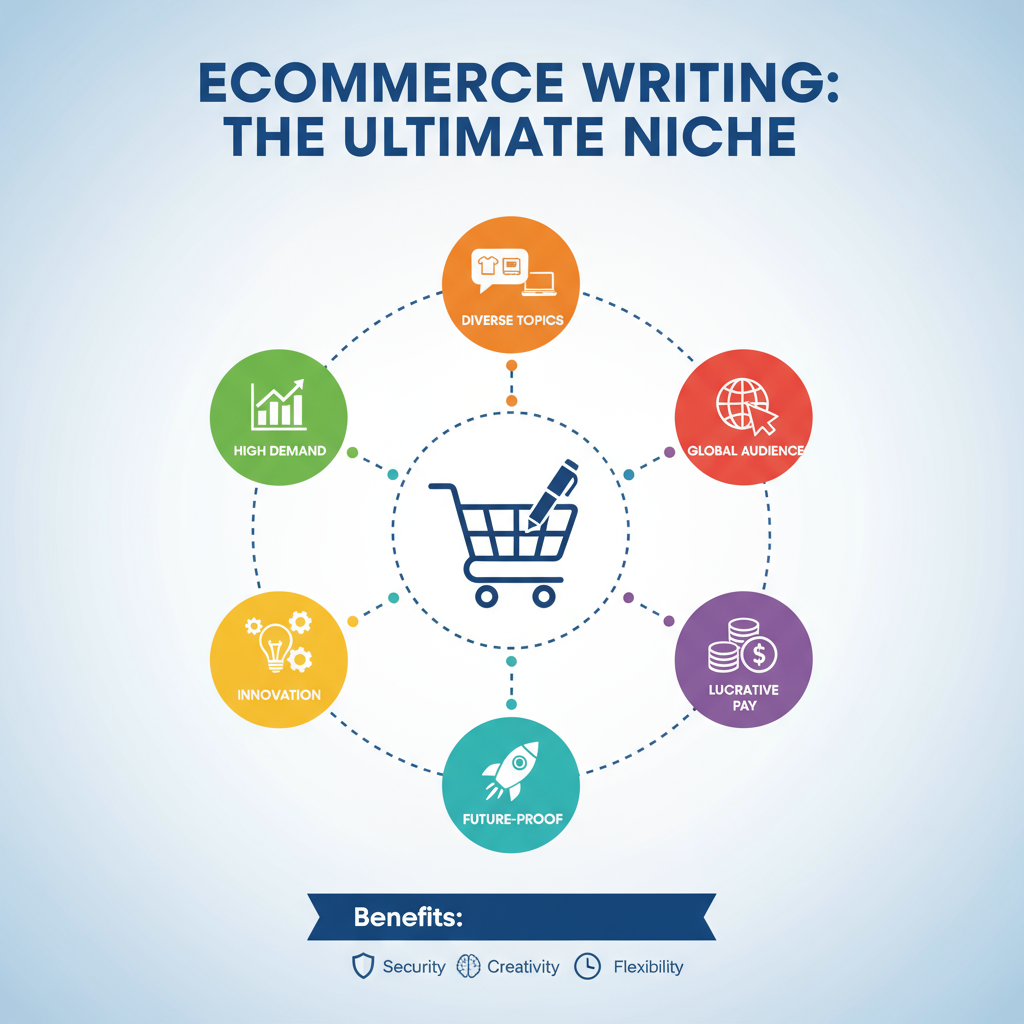
Why choose e-commerce content writing niche as a writer? If you’re a freelancer or blogger, choosing a niche is one of the most important decisions you’ll make for your career. And while there are dozens of profitable niches out there, e-commerce stands out as one of the fastest-growing and most rewarding areas for content writers in 2025.
E-commerce isn’t just about online shopping anymore—it’s about shaping experiences, building trust, and helping brands connect with buyers across the globe. For writers, this means endless opportunities to specialize, grow, and earn well.
What Makes E-commerce a Strong Niche for Writers?
Explosive growth: Online shopping keeps expanding. From fashion to furniture to SaaS tools sold on subscription, e-commerce touches nearly every industry.
Content-driven marketing: Unlike traditional retail, online businesses live and die by their content—product descriptions, blog posts, SEO pages, social media, and more.
Diverse roles: From writing conversion-focused copy to educational long-form guides, e-commerce content writing offers a role for every skill set.
Global demand: Whether it’s small D2C startups or global marketplaces, every brand selling online needs skilled writers to reach and retain customers.
Key E-commerce Content Writing Roles
Product Description Writer
Craft persuasive, SEO-friendly descriptions that make products irresistible. A strong description can make the difference between a sale and an abandoned cart.
SEO Content Writer
Write keyword-rich blogs, buying guides, and landing pages that attract organic traffic and keep customers engaged.
Email & SMS Copywriter
Design high-converting campaigns for abandoned carts, promotions, and customer retention. E-commerce brands rely heavily on email and SMS to drive revenue.
Ad Copywriter
Specialize in crafting short, persuasive content for Google Ads, Meta Ads, or TikTok campaigns—where every word counts.
Content Strategist for E-commerce
Develop content calendars, oversee blogs, and plan campaigns that align with product launches, seasonal sales, and customer journeys.
Social Media Content Writer
Create engaging posts, captions, and scripts for reels or short-form videos that amplify brand visibility and sales.
Technical/UX Writer
Focus on guides, FAQs, and customer support content that improve user experience and reduce friction in the buyer’s journey.
Writing for B2B, B2C, and D2C in E-commerce
One of the best things about e-commerce content is the variety of business models you can write for. Each has unique content needs:
B2C (Business-to-Consumer)
Writing is emotional, persuasive, and benefit-driven.
Focuses on creating desire and urgency (e.g., fashion, beauty, fitness brands).
Typical content: product descriptions, social media posts, influencer-style blogs, and seasonal campaigns.
B2B (Business-to-Business)
Writing is educational, trust-building, and logical.
Targets decision-makers who want ROI and product value (e.g., SaaS tools, wholesale suppliers).
Typical content: whitepapers, case studies, long-form blogs, comparison guides, LinkedIn content.
D2C (Direct-to-Consumer)
Combines the personal tone of B2C with the brand-building strategy of B2B.
Focuses on storytelling, authenticity, and community-building (e.g., skincare startups, eco-friendly lifestyle brands).
Typical content: founder stories, brand-driven blogs, user-generated content, newsletters.
Benefits of Choosing E-commerce Content Writing Niche
High demand: Every online store needs a steady flow of content.
Recurring work: Blogs, newsletters, and seasonal campaigns ensure consistent projects.
Scalability: Writers can expand into strategy, team management, or even start their own content agency.
Diverse industries: You can specialize in fashion, tech, wellness, SaaS, or even niche product categories like pet care or eco-products.
Portfolio strength: E-commerce projects often deliver measurable results (e.g., traffic growth, conversions), making your portfolio more attractive to future clients.
Example: Content Calendar for a D2C Skincare Brand
| Month | Theme | Content Pieces | Goal |
|---|---|---|---|
| January | “New Year, New Skin” | Blog: Skincare Resolutions, Email: Product Bundles, IG Reels: Routine Tips | Drive seasonal sales |
| February | “Love Your Skin” | Blog: Self-Care Routines, Newsletter: Gift Guides, Ads: Valentine Discounts | Boost engagement and gifting |
| March | “Spring Refresh” | Blog: Detox Your Skin, SEO Page: Best-Sellers, YouTube Tutorial | Rank for seasonal keywords |
| April | “Eco-Friendly Skincare” | Blog: Sustainable Ingredients, Social: Earth Day Campaign, Case Study | Build brand authority |
| May | “Summer Glow” | Blog: Sun Protection Tips, Email: SPF Products, TikTok: Skincare Hacks | Promote summer essentials |
This kind of calendar shows clients you can think strategically about campaigns while delivering content across channels.
Final Thoughts
E-commerce is more than a niche—it’s an entire ecosystem where writers play a direct role in driving sales and shaping brand identity. By choosing e-commerce as your niche, you’re setting yourself up in one of the most future-proof, high-demand, and lucrative spaces for content writing in 2025.
Whether you prefer writing for B2C shoppers, B2B buyers, or D2C communities, there’s space to carve out your expertise, charge premium rates, and grow your career.
Start by picking one e-commerce vertical you’re curious about and create 3–4 samples tailored to it. The market is vast, and your niche is waiting.
Pingback: How to start creative writing-Top 6 tips to begin
Pingback: What is meant by content writing